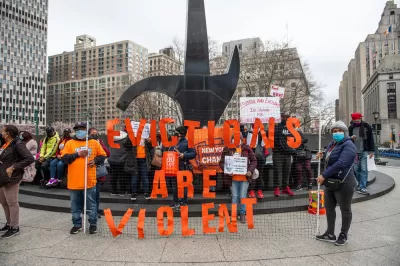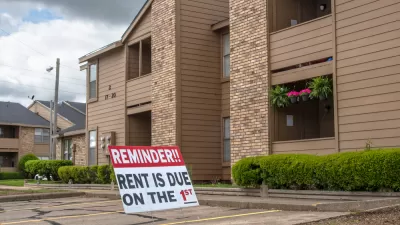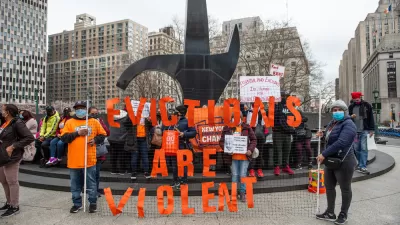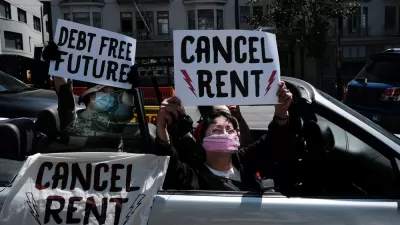The federal government has never provided so much aid to renters, but rental assistance is still failing to reach the people who need it most.

The risk of millions of evictions as a consequence of the pandemic's economic downturn has loomed over the nation for more than a year. The risk persists, according to a recent article by Jerusalem Demsas, despite an unprecedented level of funding devoted to rental assistance and eviction moratoria at multiple layers of government.
"Getting money into the hands of renters has been exceedingly complicated — the National Low Income Housing Coalition has found over 340 different programs attempting to administer the federal aid. Some programs require onerous documentation; others don’t make it easy for landlords to apply and most put the onus on tenants to provide extensive proof of need," explains Demsas.
The stopgaps provided by eviction moratoria have also proven insufficient, and they are also due to expire soon. According to Demsas, "with the federal eviction moratorium expiring at the end of June, and several judges attempting to strike it down before then, states may have mere weeks to get money into the hands of renters before eviction processes start up again in earnest."
"Not a single expert or advocate Vox spoke with believes the money will be allocated by then," reports Demsas.
Money allocated in December 2020 and again in March 2021 came too late, according to Diane Yentel, president and CEO of the National Low Income Housing Coalition, as quoted in the article. Renters had already accrued nearly $50 billion in rent arrears, according to Yentel, but various estimates place the amount of back rent owed in the country anywhere between $8.4 billion and $52.6 billion. "[T]he $45 billion allocated should cover the vast majority of need," according to Demsas, but that doesn't mean the vast majority of renters are clear of the pandemic's economic consequences.
The source article includes more data on the state of the rental housing market, rent debt, and the effort by various levels of government to relieve the economic stress on renters.
FULL STORY: What happened to the $45 billion in rent relief?

Alabama: Trump Terminates Settlements for Black Communities Harmed By Raw Sewage
Trump deemed the landmark civil rights agreement “illegal DEI and environmental justice policy.”

Study: Maui’s Plan to Convert Vacation Rentals to Long-Term Housing Could Cause Nearly $1 Billion Economic Loss
The plan would reduce visitor accommodation by 25% resulting in 1,900 jobs lost.

Planetizen Federal Action Tracker
A weekly monitor of how Trump’s orders and actions are impacting planners and planning in America.

Wind Energy on the Rise Despite Federal Policy Reversal
The Trump administration is revoking federal support for renewable energy, but demand for new projects continues unabated.

Passengers Flock to Caltrain After Electrification
The new electric trains are running faster and more reliably, leading to strong ridership growth on the Bay Area rail system.

Texas Churches Rally Behind ‘Yes in God’s Back Yard’ Legislation
Religious leaders want the state to reduce zoning regulations to streamline leasing church-owned land to housing developers.
Urban Design for Planners 1: Software Tools
This six-course series explores essential urban design concepts using open source software and equips planners with the tools they need to participate fully in the urban design process.
Planning for Universal Design
Learn the tools for implementing Universal Design in planning regulations.
Caltrans
Smith Gee Studio
Institute for Housing and Urban Development Studies (IHS)
City of Grandview
Harvard GSD Executive Education
Toledo-Lucas County Plan Commissions
Salt Lake City
NYU Wagner Graduate School of Public Service





























